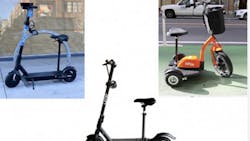SFMTA rolling out adaptive scooters
In order to provide more equitable access to transportation, the San Francisco Municipal Transportation Agency (SFMTA) required all powered scooter permittees to pilot an adaptive scooter program from January 2020 to June 2021.
From that pilot, a first of its kind among U.S. transit agencies, SFMTA says it learned important lessons that inform how it can best require scooter operators to expand access for disabled riders moving forward.
2019-2021 adaptive scooter pilot
The 2019-2021 scooter permittees, Scoot, Lime and Spin, launched their adaptive scooter pilots with devices that provided additional stability, such as a seat, a wider base and an additional wheel. Each of the three pilots offered multiple options for reserving an adaptive scooter, including submitting a request through an online form, calling directly or reserving through the company’s app. Once reserved, users were able to pick up the scooter from the company or have it delivered directly to them.
Throughout the pilot, the permittees were required to connect with different disability organizations to evaluate their program’s efficacy and solicit feedback on how best to meet their needs. This included surveys of users and roundtables with local disability organizations, including LightHouse for the Blind and Visually Impaired, Ability Now, Walk San Francisco and the Community Living Campaign.
Lessons learned
At the end of the pilot, the SFMTA required the permittees to conduct an evaluation of their programs to identify strengths and weaknesses and to share what they learned. The program had many successes during the trial period. All three permittees were able to offer the adaptive scooter rentals free of charge (Lime had a $5 refundable deposit), making the program financially accessible.
In addition, based on user feedback, permittees were able to make modifications to existing models and introduce new, more useful models to their adaptive fleets during the pilot program. For example, all permittees altered seats so they could be raised and lowered based on the user’s height, and Lime and Spin added baskets so users could carry personal belongings. Starting in February of 2021, Scoot placed some of their adaptive scooters on the street, allowing anyone to rent them on demand.
By the end of the pilot, 158 different people had rented an adaptive scooter at least once, for a total of 786 rides. Input received from the community throughout the pilot underscored the importance of offering an array of scooter models that allow people with different mobility needs to access the program.
Incorporating lessons learned from the pilot program, permittees are now required to provide adaptive scooters as a minimum of five percent of their on-street fleet.
What’s next: Permanent adaptive requirements for scooter operators
The new scooter permit began July 1, 2021, for Spin and Lime and on Aug. 20 for Scoot. All on-street adaptive devices are rentable from the permittee’s existing mobile app, meaning a rider can reserve and ride an adaptive scooter in the same way as a standard scooter.
The adaptive scooters must feature at least two of the following expansions to increase access: three wheels, a seat or basket. Rental costs for adaptive scooters must be equal to or less than the rental cost of a general fleet scooter.
In addition to requiring the on-street adaptive scooters, SFMTA also incentivized permittees to continue piloting and testing additional adaptive scooter devices and service models, such as rental/testing hubs out in the community, pick up and drop off services and additional community partnerships.
